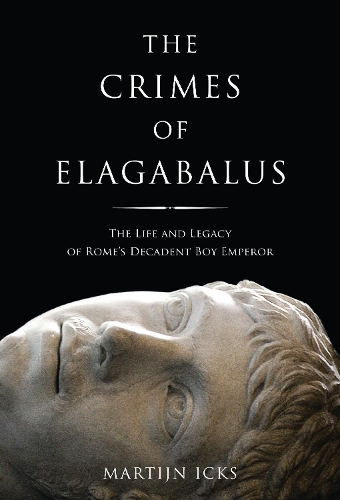
The Crimes of Elagabalus: The Life and Legacy of Rome's Decadent Boy Emperor
(Paperback)
Publishing Details
The Crimes of Elagabalus: The Life and Legacy of Rome's Decadent Boy Emperor
By (Author) Martijn Icks
Bloomsbury Publishing PLC
I.B. Tauris
10th April 2013
United Kingdom
Classifications
General
Non Fiction
European history
Ancient religions and Mythologies
936.03092
Physical Properties
Paperback
288
Width 134mm, Height 214mm, Spine 24mm
380g
Description
Elagabalus was one of the most notorious of Rome's 'bad emperors': a sexually-depraved and eccentric hedonist who in his short and riotous reign made unprecedented changes to Roman state religion and defied all taboos. An oriental boy-priest from Syria - aged just fourteen when he was elevated to power in 218 CE - he placed the sun god El-Gabal at the head of the established Roman pantheon, engaged in orgiastic rituals, took male and female lovers, wore feminine dress and was alleged to have prostituted himself in taverns and even inside the imperial palace. Since his assassination by the Praetorian Guard at the age of eighteen, Elagabalus has been an object of fascination to historians and a source of inspiration for artists and writers. This immensely readable book examines the life of one of the Roman Empire's most colourful figures, and charts the many guises of his legacy: from evil tyrant to firebrand rebel, from mystical androgyne to modern gay teenager, from decadent sensualist to ancient pop star.
Reviews
Icks' book [is] an excellent overview, worth adding to the Roman history shelves of anybody's library. But it's the second half of The Crimes of Elagabalus that makes the book truly remarkable. In those later chapters, Icks completes his careful, detailed narrative of the boy-emperor's brief reign and turns to the surprisingly vast literary legacy that reign generated. Play by play, pamphlet by pamphlet, novel by novel, Icks painstakingly traces how centuries of non-historians have characterized Elagabalus This will be the standard account in English for the foreseeable future.--Steve Donoghue"Open Letters Monthly" (03/01/2012)
This is not a routine imperial biography, but a much wider study of the nature of religious belief, culture, and ethnicity in the Roman Empire, on the staging of the emperor's image and the subsequent response throughout the Empire. In this accessible and lively study, Icks sheds new light on the dissemination of classical culture and the reception of Rome in later periods by following the evolving figure of Elagabalus in opera, drama and fiction through the centuries.--Brian Campbell, Queen's University, Belfast
Icks not only reconstructs the events of Elagabalus's short reign, but looks at how artists and writers have perceived him. Elagabalus has been seen as an archetype of decadence and Orientalism and, in recent years, as a member of the gay community. The fictional Elagabalus has strayed far from the historical evidence. This ambitious book is the result of earnest research, and it will challenge readers.--J. A. S. Evans"Choice" (08/01/2012)
Author Bio
Martijn Icks is a postdoctoral fellow at the University of Dusseldorf, Germany. He obtained his PhD cum laude at the University of Nijmegen, The Netherlands in 2008.
